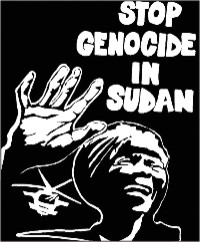Law news
Sudan and UN reach new peacekeeping deal for Darfur
The United Nations Security Council and the Sudanese government nday hammered out the major details of a proposal to send more than 20,000 peacekeeping troops to Darfur, clearing the way for a joint force with the African Union, which will be led and paid for by the United Nations.
 After a two-hour meeting with senior Sudanese officials in Khartoum, the delegation from the Security Council announced at a news conference there that it had reached an agreement for the force to be under United Nations command, though its day-to-day operations would be run by the African Union. The issue had been a sticking point for countries that might contribute troops to the operation but balked at being under African Union command.
After a two-hour meeting with senior Sudanese officials in Khartoum, the delegation from the Security Council announced at a news conference there that it had reached an agreement for the force to be under United Nations command, though its day-to-day operations would be run by the African Union. The issue had been a sticking point for countries that might contribute troops to the operation but balked at being under African Union command.
After meeting with Sudan's president, Omar al-Bashir, and foreign minister, Lam Akol, the Security Council ambassadors said at the news conference that senior Sudanese officials had made an unconditional commitment to the new force. “I can tell you that the foreign minister told us in no uncertain terms that the government of Sudan accepted the hybrid operation without any conditionality,” said Dumisani S. Kumalo, South Africa's ambassador to the United Nations. “The president himself just confirmed the same thing to us.”
The statement appeared to lay to rest momentarily concerns that Sudan would insist that only African troops be allowed to serve in the peacekeeping force, which will shore up a beleaguered African Union force of 7,000 troops struggling to maintain order in the lawless region. The United States had warned that if Sudan set such conditions it could be cause to press ahead with plans to place new sanctions on Sudan over the violence in Darfur. At least 200,000 people have died and 2.5 million have been pushed from their homes since Sudan's government armed tribal militias to fight alongside its army against a rebel group that sought greater autonomy and wealth for the long-neglected region.
Sudan has resisted allowing a United Nations force to deploy in Darfur, saying such a force would represent an unacceptable violation of the country's sovereignty, despite the fact that there is already a large United Nations force in southern Sudan. The ambassadors said they would ask the United Nations to pay for the force out of its peacekeeping budget. The African Union force has been largely supported by the United States and other Western donor nations, but has been nearly bankrupt for months as Sudan resisted the deployment of a stronger force and donors lost confidence in its peacekeeping efforts.
Mr. Akol, the foreign minister, said Sudan was ready to work toward peace. “I can tell you that we, together with the United Nations and the African Union, will work together to resolve the problems in Darfur,” he said at the news conference. “This tripartite cooperation should therefore not come as a surprise because we all aim to achieve peace and stability in Darfur.”
The new force is not expected to be sent until next year, but when it does it will face chaos in Darfur and an even more complicated military and political environment than at the start of the conflict. The rebel groups are fractured, tribal militias fight among themselves and there is no currently recognized cease-fire. Emyr Jones Parry, Britain's ambassador to the United Nations, said reaching a new cease-fire agreement and new negotiations for a political deal to end the conflict were paramount. “There isn't going to be an enduring peace unless there is a political settlement,” Mr. Jones Parry said.
Source: Unwire.